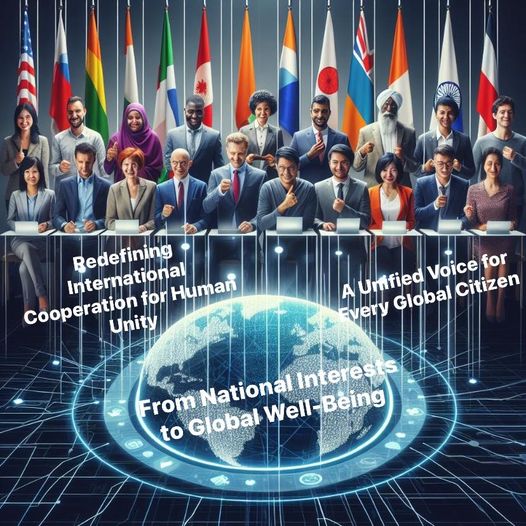
In the contemporary era, extensive interactions and exchanges between nations have fostered a global community. Yet, the true essence of human unity often remains obscured. While the world promotes division and categorization into nations, driving bloc politics, the shifting global order compels us to advocate for the unification of humanity, aiming to establish a union that transcends borders and embraces collective human unity.
The current world order encourages cooperation and collaboration among specific political entities within nations, but true human unity encompasses all individuals, regardless of nationality, ethnicity, or other societal divisions. It acknowledges the inherent dignity and worth of every human being, promoting equality, understanding, and shared responsibility.
By embracing human unity, societies can overcome the limitations imposed by artificial boundaries and divisions created after the WW2. This fosters empathy, compassion, and interconnectedness among individuals, leading to a more harmonious and peaceful world. Shifting the focus from national interests to the well-being and common goals of all humanity makes it easier to address global challenges such as poverty, inequality, climate change, and conflicts. What is needed is to transform the United Nations into a true international government organization funded by taxpayers from around the world.
Implementing an International Government by Transforming the United Nations
1. Global Representation and Voting System
To ensure fair representation, the United Nations should adopt a global voting system where every individual’s vote counts equally. This would necessitate restructuring the General Assembly to reflect the principle of one person, one vote, rather than the current nation-based representation with veto power. This transition would involve establishing a Global Electoral Commission (GEC) to oversee and manage the voting process, creating electoral districts by dividing the world into large areas based on population to ensure densely populated regions receive appropriate representation while maintaining regional diversity, implementing a universal voter registration system to ensure every eligible individual is registered, developing a digital voting infrastructure, and establishing a comprehensive legal framework to govern the global electoral process, addressing issues like voter fraud and electoral disputes.
By implementing a global representation and voting system, we can ensure that every individual’s voice is heard in the international governance process. A truly representative and democratic global governance system will reflect the will of the entire human population. This system would promote fairness, transparency, and inclusivity, paving the way for a more democratic and unified world order.
Through this voting system, we will elect a Global President, who will serve as the chief diplomat, global leader, and representative of the international community. The Global President would appoint a cabinet of ministers, each overseeing specific global departments (e.g., health, environment, human rights). These appointments would require confirmation by a global legislature to ensure checks and balances.
2. Global Taxation System
A unified international government would need a global taxation system. This could involve a small, standardized tax on income or transactions across all member states. The collected funds would support global initiatives, ensuring that every taxpayer directly contributes to and benefits from international governance.
3. Enhanced Powers and Mandate
The new United Nations would need enhanced powers to enforce international laws and policies effectively. This includes the ability to intervene in cases of human rights violations, environmental degradation, and conflicts, transcending the limitations of national sovereignty when necessary for the greater good.
4. Unified Legal Framework
Creating a unified legal framework that upholds justice and human rights globally is crucial. This framework should be based on existing international human rights laws but with the authority to enforce them universally. A global judiciary body, similar to the International Court of Justice but with broader jurisdiction, would be essential.
5. Education and Cultural Exchange Programs
Promoting understanding and empathy through global education and cultural exchange programs can help build a sense of global citizenship. These programs should focus on shared human values and the importance of collective responsibility.
6. Conflict Resolution and Peacekeeping
A reformed United Nations would need a robust mechanism for conflict resolution and peacekeeping. This includes a well-equipped and impartial international peacekeeping force capable of intervening in conflicts and maintaining peace without bias.
The establishment of an international government, transformed from the United Nations, would eliminate the need for regime change, orchestrating coups, cyber attack, proxy wars, and conquering territory by fostering a global system rooted in equality, justice, and collective responsibility. This unified government would ensure fair representation and uphold human rights universally, removing the motivations for power struggles and territorial expansion. By addressing underlying issues such as poverty, inequality, and political oppression through a globally coordinated effort, the new system would mitigate the root causes of conflict and instability. With a robust mechanism for conflict resolution and a commitment to shared human values, the impetus for violent upheavals and aggressive expansions would diminish, paving the way for a more peaceful and cooperative world order.
7. Sustainable Development and Climate Action
A global government must prioritize sustainable development and climate action. Implementing worldwide policies to combat climate change, reduce poverty, and promote economic equality is essential. This requires coordinated efforts and shared technology and resources.
8. Public Participation and Transparency
Ensuring transparency and public participation in decision-making processes is vital for legitimacy. Creating platforms for global citizens to voice their opinions and influence policies can help build trust and accountability.
In a world driven by human unity, conflicts and tensions rooted in nationalistic or sectarian interests can be overcome. This would pave the way for dialogue, cooperation, and mutual understanding, fostering a collective sense of responsibility towards the well-being of our shared planet and future generations.
Ultimately, the unity of humanity through a new international government would empower us to rise above the limitations of individual nations and work together towards a common purpose: the realization of a just, peaceful, and prosperous world for all.

